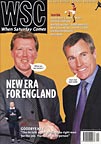 An unaccustomed and unsettling sense of well-being seems to be settling over some of the League’s recently troubled clubs. At Southend United, the unlikely partnership of George Soros and David Webb is in place and promising to take the Shrimpers out of debt and on to higher things. How much the renowned international financier knows about the Third Division may be questioned, but for the time being the property company Delancey Estates, which he controls, is shaping the destiny of the club that once discarded this month’s England manager.
An unaccustomed and unsettling sense of well-being seems to be settling over some of the League’s recently troubled clubs. At Southend United, the unlikely partnership of George Soros and David Webb is in place and promising to take the Shrimpers out of debt and on to higher things. How much the renowned international financier knows about the Third Division may be questioned, but for the time being the property company Delancey Estates, which he controls, is shaping the destiny of the club that once discarded this month’s England manager.
Delancey, which is the major shareholder in Southend along with its associated company Martin Dawn, got the club out of a High Court winding-up order in the summer and has now made another £800,000 available (not interest-free, of course). However, the club is paying £400,000 a year in rent, making the completion of their relocation plan to a new site at Fossetts Farm a matter of some urgency.
As a property company with large interests in the kind of retail opportunities which will be included in the new development, Delancey should have no reason to delay in getting on with the “futuristic” 16,000 seater stadium complex once planning permission has been granted.
Opinion on Delancey is divided. Former chairman John Main, removed from the board in September, said: “Delancey were screwing us to the floor. They have failed for months to put money into the club because they wanted to push us in a corner. We were in such a mess we shouldn’t have been trading any more. There’s no way the club can afford to pay £400,000 a season rent on Roots Hall or the 20 per cent interest owed to Delancey on every penny they hand over. United can’t survive under these terms.”
On the other hand, new director Ron Martin, chairman of Martin Dawn, assures fans: “The rents and interest will come out of the property enhancements we receive as part of our relocation plans at Fossetts Farm, which will bring substantial money to this club. Delancey may not be committed to the long term future of United but Martin Dawn is and we will be here in another five years’ time.” Watch this space.
Guarded optimism too at Mansfield, where two new stands have been opened and a third is well under way as Field Mill is turned into a modern 10,000 seater ground after an endless series of delays over the past two years. An unprecedented aura of peace surrounds relations between fans and chairman Keith Haslam.
Following a deal brokered by the government’s new Supporters Direct initiative, rep- resentatives of fan group Team Mansfield and Haslam plan to address a public meeting on November 16 about their joint plan to turn Mansfield into a “community club” with significant fan input. Not as entertaining as some of the more lurid stories previously associated with Haslam’s time at the club, but no doubt welcome for Stags fans.
Supporters Direct have also been involved at Cambridge , where a new fan group is counting on “the welcome openness of the board of directors” to forge a new partnership. Welcome openness? Board of directors? Some mistake, surely.
Even Oxford have reasons to be cheerful, with work on their Marie Celeste Stadium due to re- start, ooh, any minute now. Thankfully there are still one or two chairmen of the old school still around, not least the ever reliable Michael Knighton at Carlisle (although he is no longer technically chairman, having been disqualified from being a director in September after a DTI investigation into a separate company).
The club has just repaid his holding company CUFC Holdings the last instalment of £240,000 for a loan, yet the same company owes Carlisle the best part of £400,000. The playing budget has been slashed from £1.1 million last season (when the club was so successful) to £450,000. The club recently paid out their first transfer fee for three years, £10,000 (in two instalments) to Northwich Victoria for Mark Birch. What more could the fans want than that?
From WSC 166 December 2000. What was happening this month